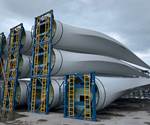Bureau Veritas, Cornis partner on wind blade inspection
The companies offer advanced blade inspection that uses automated artificial intelligence, a global database and digital processing of images.

Certification company Bureau Veritas (Paris, France) has signed a cooperation agreement with Cornis (Paris), a provider of wind turbine blade inspections and artificial intelligence (AI) solutions, to offer wind farm owners and operators advanced blade inspection (ABI) services based on in-situ data collection and digital processing of images.
ABI uses HD cameras to scan the external surface of a blade, while an automated AI tool recognizes and measures defects on the blade surface using a database of more than 30,000 blades. The type and severity of any defects are presented on a smart web-based platform. With ABI, Bureau Veritas says that clients can benefit from a safer and faster method of blade assessment that leads to more accurate results.
“This partnership draws on Cornis’ unrivaled experience in high-quality technology for blade inspections and Bureau Veritas’ vast global network of experts,” says Stephan Ciniselli, market leader for power and utilities at Bureau Veritas. “By working together, we will be better positioned to support clients across the globe with high-quality blade inspection services, particularly in Europe, in South America, Asia and the Middle East.”
By working with Cornis, Bureau Veritas says it can further support its clients across the wind sector. Bureau Veritas experts will conduct on-site blade inspections using technologically advanced equipment, while Cornis specialists process data and create complete HD images of each blade.
Related Content
-
Bladder-assisted compression molding derivative produces complex, autoclave-quality automotive parts
HP Composites’ AirPower technology enables high-rate CFRP roof production with 50% energy savings for the Maserati MC20.
-
Corebon induction heating
This sidebar to CW’s August 2024 feature article reviews this technology for more efficient composites manufacturing and why it aligns with Koridion active core molding.
-
ASCEND program completion: Transforming the U.K.'s high-rate composites manufacturing capability
GKN Aerospace, McLaren Automotive and U.K. partners chart the final chapter of the 4-year, £39.6 million ASCEND program, which accomplished significant progress in high-rate production, Industry 4.0 and sustainable composites manufacturing.
.jpg;width=70;height=70;mode=crop)





